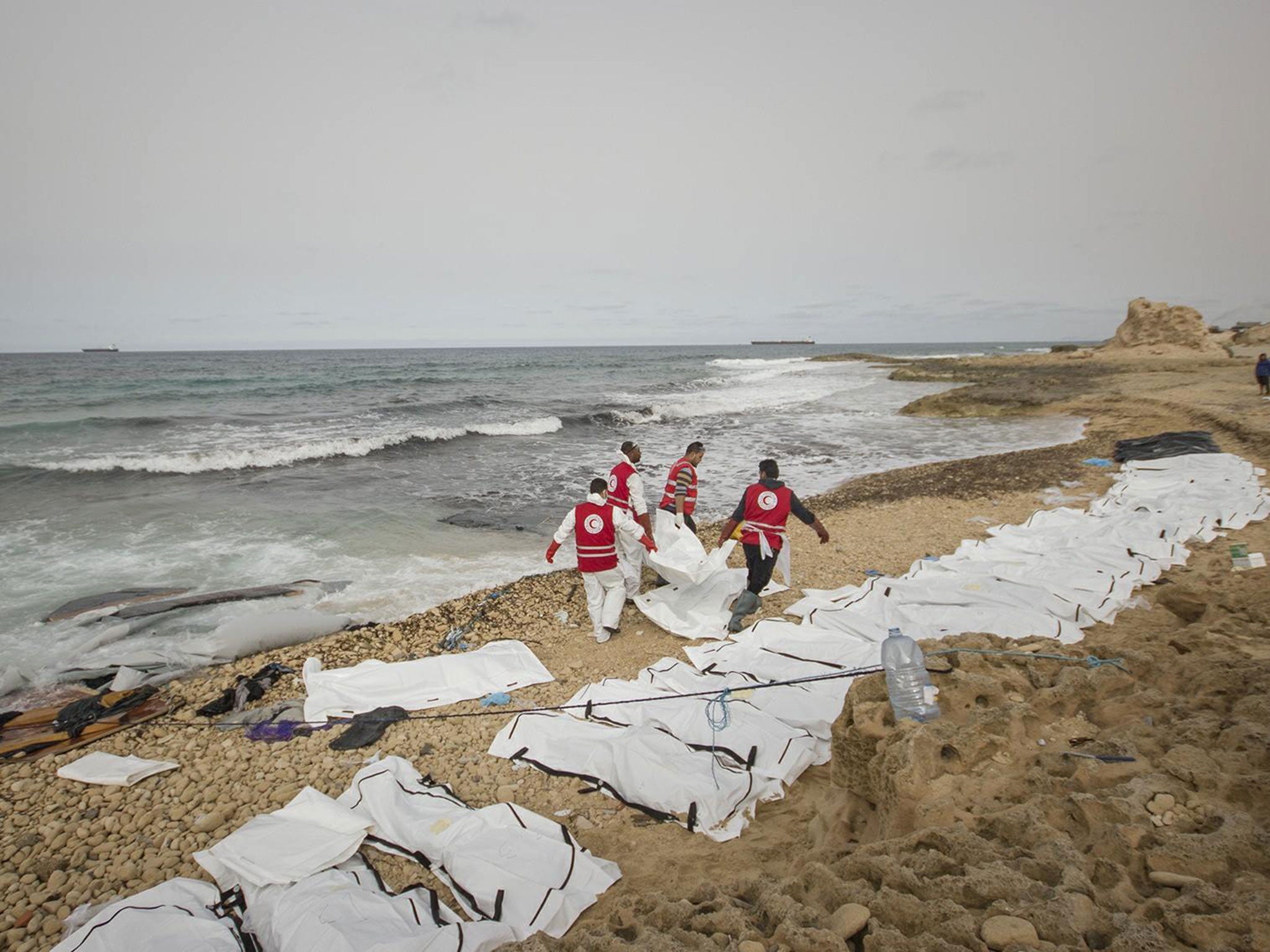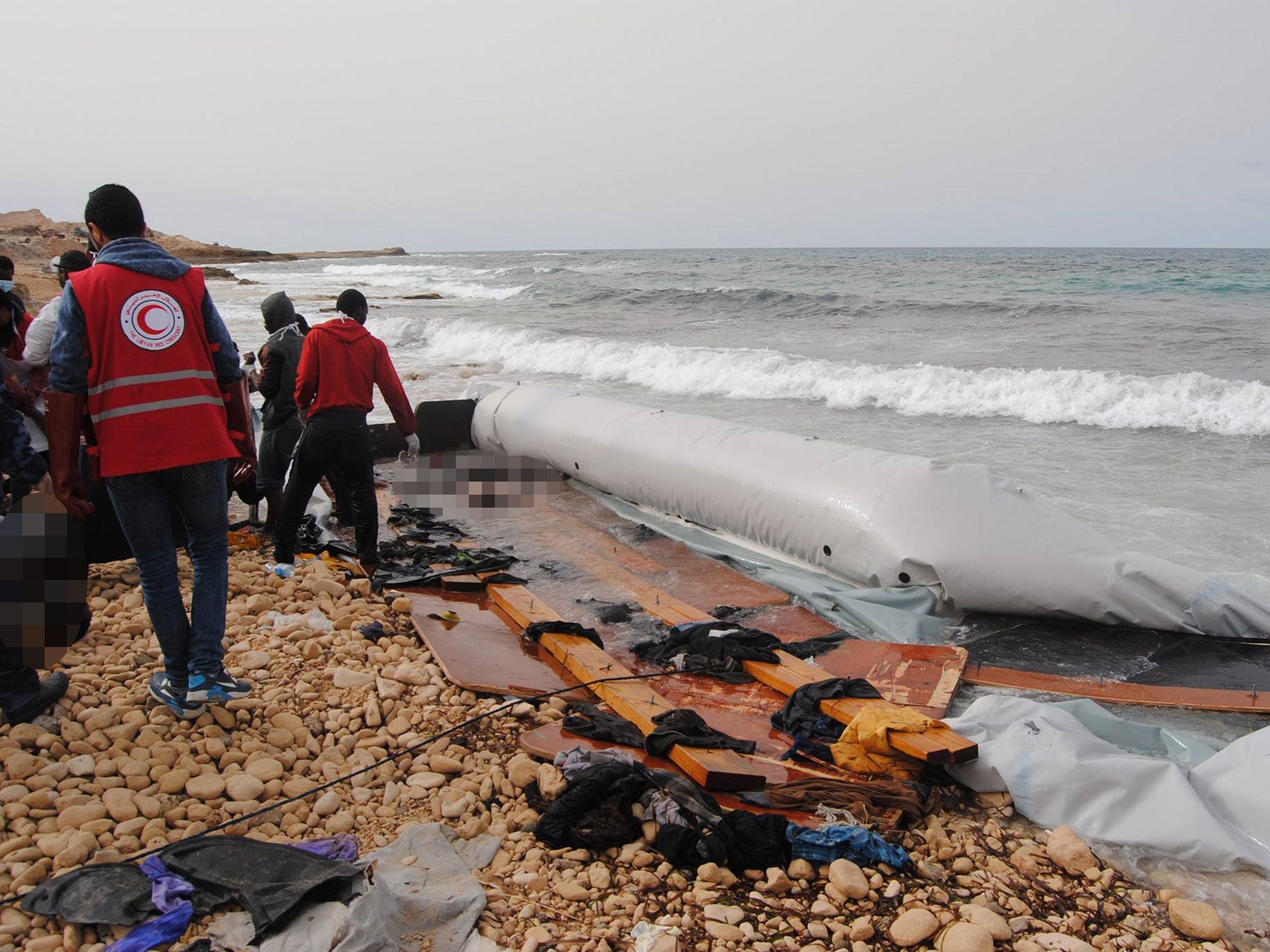More than 70 refugees wash up dead on Libyan beach after boat disaster attempting to cross Mediterranean Sea
Possibility migrants may have been ‘murdered’ after bodies found inside dinghy

More than 70 refugees have died in the latest boat disaster in the Mediterranean Sea as deaths on the crossings between Libya and Italy reach record highs.
The Libyan Red Crescent said the bodies of 74 migrants had washed ashore near the city of Zawiyah, which is a hub for smugglers launching boats towards Europe.
The port’s coastguard posted a video showing a ruined dinghy lying without an engine on the shoreline as the first bodies were recovered.

The victims, thought to be sub-Saharan Africans, were put inside numbered body bags and lined up along the beach, which was littered with debris as large waves crashed on the shore.
Drowned migrants are frequently washed up on Libya’s coastline after sinkings at sea but the discovery of bodies inside the boat raised questions about the cause of the latest disaster.
Joel Millman, from the International Organisation for Migration (IOM), said it the boat’s engine was believed to have been removed at sea, possibly by smugglers or armed gangs.
“In most cases you don’t find remains in a boat – you find them washed up or floating, although there have been cases of suffocation on board,” he told The Independent.
“We have heard about arguments occurring with smugglers, where people refuse to get in a boat because they are concerned it isn’t seaworthy.
“Then there’s violence and people are killed, while the rest are forced inside. In this case we just don’t know what happened.”
Mr Millman suggested that the incident could have resulted from the “deliberate punishment or murder of migrants”.

Dinghies are routinely overloaded with around 150 people by smugglers and it was unclear whether anyone else was on board or if they survived.
A spokesperson for the Red Crescent said the bodies would be buried at a cemetery allocated to unidentified people in Tripoli.
The International Federation of Red Cross (IFRC) condemned continuing international inaction over migrant deaths.
“The IFRC calls for collective international action to avert further deaths like these which are tragic and entirely preventable,” a spokesperson said.
The latest deaths push the number of refugees killed attempting boat crossings to Europe this year to around 330, although the number is believed to be an underestimate as not all bodies washed up in Libya are recorded by the United Nations and victims are not always found.
Crossings have continued through the winter, despite treacherous conditions at sea, and the EU has been partly blamed for spiralling death rates after smugglers switched from wooden fishing vessels to flimsy dinghies that are harder for security agencies to detect.
More than 5,000 refugees were drowned, suffocated or died of hypothermia at sea in 2016 – the vast majority on the Central Mediterranean route from Libya, which is now the deadliest crossing in the world.
European leaders met in Malta earlier this month to discuss efforts to stem the crisis but resolutions to increase funding and support for Libyan authorities were criticised amid allegations of widespread human rights abuses.
The country remains divided between battling militias as its civil war enters a fifth year, with militant groups kidnapping, detaining and ransoming migrants or forcing them into labour as a source of income.
Nato has received a request from the Libyan government for support, while world leaders agreed to help bolster its capability at a summit in Malta earlier this month and Italy has pledged millions of euros in funding for anti-smuggling initiatives.
The Royal Navy has been training the Libyan coastguard since October and the British government is part of a £1.7m programme to improve the conditions in detention centres, as well as pledging £5.8m aid for Libya.
The Ministry of Defence said it was supporting the country's Government of National Accord and would take alleged human rights abuses into consideration.
More than 12,000 people have arrived in Europe by sea so far this year, mainly from Syria, Afghanistan, Nigeria, Iraq, Eritrea and other sub-Saharan African nations.
Join our commenting forum
Join thought-provoking conversations, follow other Independent readers and see their replies
Comments
Bookmark popover
Removed from bookmarks